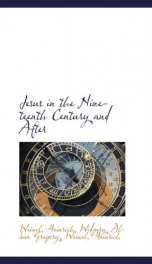jesus in the nineteenth century and after

JESUS IN , THE NINETEENTH CENTURY AND AFTER BY HEINRICH WEINEL, PREFACE HE present volume is based on Dr. Weincls Jeau T in 19. Jalrrlrundert which has drmdy had an exceptionally large circulation. The whole has been revised and brought up to date, and its scope has been widened by the consideratioll of English, American, and French life and thought, and of one Italian thinker, Mazzini. It has now, therefore, a reference to almost the whole sphere of western civilisation. The plan of the volume is largely, and what is best in it entirely, due to Dr. Weinel. The English form-often an adaptation-given to the revised and enlarged German original is due to me, as is also the Introduction, and, with the exception of the portions treating of Renal1 and Oscar Wilde, everything that is said with reference to hfazzini, and the Eoglish, American, and French thinkers and the problems raised by them. Though the work, as its title implies, is predominantly historical, even the most cursory perusal of it will reveal that a definite attitude towards the religious and social questions of our time is here advocated. In contrast with the tendency of that modern mysticism, orthodox and unorthodox, which finds its inteqectual support in Ecclesiastical Dogma, Absolute Idealism, or Neutral Alonisnl, the personal and the historical are here regarded as fundamental in Reality and vital ill Religion. All mysticism is not thereby denied, for ill the relation of person to person thought is faced with something illdefinable, solllctliing ultimate, something mystical. In the reallll of peisons and in the course of history no one has 11nd or has n higher place or greater influence upon the religious life of the western world than Jesus and the religious geniuses and saints of the eastern world are dwarfs in comparison with him. It is not that theological reflection makes Jesus central for religion he is central by his intrinsic worth theology has but to accept the fact and present it in the light of advancing knowledge and in relation to changing practical problems. In his attitude and teaching, thus considered, we find the highest that has been offered to men for the satisfaction of their religious needs. No religious need has yet manifested itself to which he does not give the best satisfactio open to mankind, and at present it is impossible to conceive in what direction we should have to look for sometliing higher, even if there be anything higher. The truth he reveals may indeed be final for religion. The influence he exerts may never be surpassed. Religion is the expression of what is innermost in personal life, and. from it the whole life of men should be influenccd. On the acceptance of that as a truth depends the claim that here we are not concerned with a mere theoretical discussion, but that me contend for t-i type of lifen which carries into every sphere of activity the implications of its fundamental principles. In spite of the assertions of superficial but probably honest scoffers to the contrary, ideas and principles, whether preached froin the pulpit, the printed page, or the stage, have m enormous influence on human conduct and happiness...
Info about the book
Author:
Series:
Unknown
ISBN:
0807010294
Rating:
4.5/5 (2)Your rating:
0/5
Languge:
English
Users who have this book
Users who want this book
What readers are saying
What do you think? Write your own comment on this book!
write a commentif you like jesus in the nineteenth century and after try:
Do you want to read a book that interests you? It’s EASY!
Create an account and send a request for reading to other users on the Webpage of the book!



